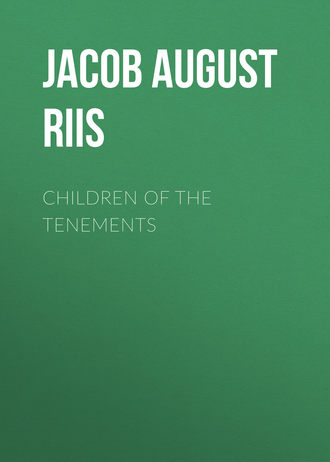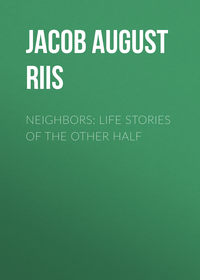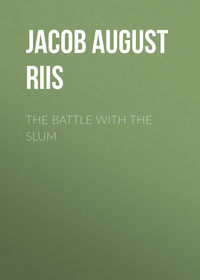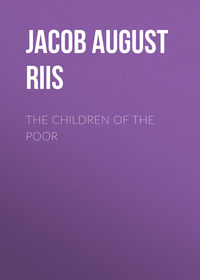 полная версия
полная версияChildren of the Tenements
"But there must be, or else it isn't a real Christmas tree," said the professor, and brought out the little dollar. "This is a dollar which a friend gave me for the children's Christmas, and she sends her love with it. Now, you buy them some things and a few candles, Mrs. Ferguson, and then a good supper for the rest of the family. Good night, and a Merry Christmas to you. I think myself the baby is getting better." It had just opened its eyes and laughed at the tree.
The professor was not very far on his way toward keeping his appointment with Santa Claus before Mrs. Ferguson was at the grocery laying in her dinner. A dollar goes a long way when it is the only one in the house; and when she had everything, including two cents' worth of flitter-gold, four apples, and five candles for the tree, the grocer footed up her bill on the bag that held her potatoes—ninety-eight cents. Mrs. Ferguson gave him the little dollar.
"What's this?" said the grocer, his fat smile turning cold as he laid a restraining hand on the full basket. "That ain't no good."
"It's a dollar, ain't it?" said the woman, in alarm. "It's all right. I know the man that give it to me."
"It ain't all right in this store," said the grocer, sternly. "Put them things back. I want none o' that."
The woman's eyes filled with tears as she slowly took the lid off the basket and lifted out the precious bag of potatoes. They were waiting for that dinner at home. The children were even then camping on the door-step to take her in to the tree in triumph. And now—
For the second time a restraining hand was laid upon her basket; but this time it was not the grocer's. A gentleman who had come in to order a Christmas turkey had overheard the conversation, and had seen the strange bill.
"It is all right," he said to the grocer. "Give it to me. Here is a dollar bill for it of the kind you know. If all your groceries were as honest as this bill, Mr. Schmidt, it would be a pleasure to trade with you. Don't be afraid to trust Uncle Sam where you see his promise to pay."
The gentleman held the door open for Mrs. Ferguson, and heard the shout of the delegation awaiting her on the stoop as he went down the street.
"I wonder where that came from, now," he mused. "Coupons in Bedford Street! I suppose somebody sent it to the woman for a Christmas gift. Hello! Here are old Thomas and Snowflake. Now, wouldn't it surprise her old stomach if I gave her a Christmas gift of oats? If only the shock doesn't kill her! Thomas! Oh, Thomas!"
The old man thus hailed stopped and awaited the gentleman's coming. He was a cartman who did odd jobs through the ward, so picking up a living for himself and the white horse, which the boys had dubbed Snowflake in a spirit of fun. They were a well-matched old pair, Thomas and his horse. One was not more decrepit than the other.
There was a tradition along the docks, where Thomas found a job now and then, and Snowflake an occasional straw to lunch on, that they were of an age, but this was denied by Thomas.
"See here," said the gentleman, as he caught up with them; "I want Snowflake to keep Christmas, Thomas. Take this and buy him a bag of oats. And give it to him carefully, do you hear?—not all at once, Thomas. He isn't used to it."
"Gee whizz!" said the old man, rubbing his eyes with his cap, as his friend passed out of sight, "oats fer Christmas! G'lang, Snowflake; yer in luck."
The feed-man put on his spectacles and looked Thomas over at the strange order. Then he scanned the little dollar, first on one side, then on the other.
"Never seed one like him," he said. "'Pears to me he is mighty short. Wait till I send round to the hockshop. He'll know, if anybody."
The man at the pawnshop did not need a second look. "Why, of course," he said, and handed a dollar bill over the counter. "Old Thomas, did you say? Well, I am blamed if the old man ain't got a stocking after all. They're a sly pair, he and Snowflake."
Business was brisk that day at the pawnshop. The door-bell tinkled early and late, and the stock on the shelves grew. Bundle was added to bundle. It had been a hard winter so far. Among the callers in the early afternoon was a young girl in a gingham dress and without other covering, who stood timidly at the counter and asked for three dollars on a watch, a keepsake evidently, which she was loath to part with. Perhaps it was the last glimpse of brighter days. The pawnbroker was doubtful; it was not worth so much. She pleaded hard, while he compared the number of the movement with a list sent in from Police Headquarters.
"Two," he said decisively at last, snapping the case shut—"two or nothing." The girl handed over the watch with a troubled sigh. He made out a ticket and gave it to her with a handful of silver change.
Was it the sigh and her evident distress, or was it the little dollar? As she turned to go, he called her back.
"Here, it is Christmas!" he said. "I'll run the risk." And he added the coupon to the little heap.
The girl looked at it and at him questioningly.
"It is all right," he said; "you can take it; I'm running short of change. Bring it back if they won't take it. I'm good for it." Uncle Sam had achieved a backer.
In Grand Street the holiday crowds jammed every store in their eager hunt for bargains. In one of them, at the knit-goods counter, stood the girl from the pawnshop, picking out a thick, warm shawl. She hesitated between a gray and a maroon-colored one, and held them up to the light.
"For you?" asked the salesgirl, thinking to aid her. She glanced at her thin dress and shivering form as she said it.
"No," said the girl; "for mother; she is poorly and needs it." She chose the gray, and gave the salesgirl her handful of money.
The girl gave back the coupon.
"They don't go," she said; "give me another, please."
"But I haven't got another," said the girl, looking apprehensively at the shawl. "The—Mr. Feeney said it was all right. Take it to the desk, please, and ask."
The salesgirl took the bill and the shawl, and went to the desk. She came back, almost immediately, with the storekeeper, who looked sharply at the customer and noted the number of the coupon.
"It is all right," he said, satisfied apparently by the inspection; "a little unusual, only. We don't see many of them. Can I help you, miss?" And he attended her to the door.
In the street there was even more of a Christmas show going on than in the stores. Pedlers of toys, of mottoes, of candles, and of knickknacks of every description stood in rows along the curb, and were driving a lively trade. Their push-carts were decorated with fir branches—even whole Christmas trees. One held a whole cargo of Santa Clauses in a bower of green, each one with a cedar-bush in his folded arms, as a soldier carries his gun. The lights were blazing out in the stores, and the hucksters' torches were flaring at the corners. There was Christmas in the very air and Christmas in the storekeeper's till. It had been a very busy day. He thought of it with a satisfied nod as he stood a moment breathing the brisk air of the winter day, absently fingering the coupon the girl had paid for the shawl. A thin voice at his elbow said: "Merry Christmas, Mr. Stein! Here's yer paper."
It was the newsboy who left the evening papers at the door every night. The storekeeper knew him, and something about the struggle they had at home to keep the roof over their heads. Mike was a kind of protégé of his. He had helped to get him his route.
"Wait a bit, Mike," he said. "You'll be wanting your Christmas from me. Here's a dollar. It's just like yourself: it is small, but it is all right. You take it home and have a good time."
Was it the message with which it had been sent forth from far away in the country, or what was it? Whatever it was, it was just impossible for the little dollar to lie still in the pocket while there was want to be relieved, mouths to be filled, or Christmas lights to be lit. It just couldn't, and it didn't.
Mike stopped around the corner of Allen Street, and gave three whoops expressive of his approval of Mr. Stein; having done which, he sidled up to the first lighted window out of range to examine his gift. His enthusiasm changed to open-mouthed astonishment as he saw the little dollar. His jaw fell. Mike was not much of a scholar, and could not make out the inscription on the coupon; but he had heard of shinplasters as something they "had in the war," and he took this to be some sort of a ten-cent piece. The policeman on the block might tell. Just now he and Mike were hunk. They had made up a little difference they'd had, and if any one would know, the cop surely would. And off he went in search of him.
Mr. McCarthy pulled off his gloves, put his club under his arm, and studied the little dollar with contracted brow. He shook his head as he handed it back, and rendered the opinion that it was "some dom swindle that's ag'in' the law." He advised Mike to take it back to Mr. Stein, and added, as he prodded him in an entirely friendly manner in the ribs with his locust, that if it had been the week before he might have "run him in" for having the thing in his possession. As it happened, Mr. Stein was busy and not to be seen, and Mike went home between hope and fear, with his doubtful prize.
There was a crowd at the door of the tenement, and Mike saw, before he had reached it, running, that it clustered about an ambulance that was backed up to the sidewalk. Just as he pushed his way through the throng it drove off, its clanging gong scattering the people right and left. A little girl sat weeping on the top step of the stoop. To her Mike turned for information.
"Susie, what's up?" he asked, confronting her with his armful of papers. "Who's got hurted?"
"It's papa," sobbed the girl. "He ain't hurted. He's sick, and he was took that bad he had to go, an' to-morrer is Christmas, an'—oh, Mike!"
It is not the fashion of Essex Street to slop over. Mike didn't. He just set his mouth to a whistle and took a turn down the hall to think. Susie was his chum. There were seven in her flat; in his only four, including two that made wages. He came back from his trip with his mind made up.
"Suse," he said, "come on in. You take this, Suse, see! an' let the kids have their Christmas. Mr. Stein give it to me. It's a little one, but if it ain't all right I'll take it back and get one that is good. Go on, now, Suse, you hear?" And he was gone.
There was a Christmas tree that night in Susie's flat, with candles and apples and shining gold, but the little dollar did not pay for it. That rested securely in the purse of the charity visitor who had come that afternoon, just at the right time, as it proved. She had heard the story of Mike and his sacrifice, and had herself given the children a one-dollar bill for the coupon. They had their Christmas, and a joyful one, too, for the lady went up to the hospital and brought back word that Susie's father would be all right with rest and care, which he was now getting. Mike came in and helped them "sack" the tree when the lady was gone. He gave three more whoops for Mr. Stein, three for the lady, and three for the hospital doctor to even things up. Essex Street was all right that night.
"Do you know, professor," said that learned man's wife, when, after supper, he had settled down in his easy-chair to admire the Noah's ark and the duckses' babies and the rest, all of which had arrived safely by express ahead of him and were waiting to be detailed to their appropriate stockings while the children slept—"do you know, I heard such a story of a little newsboy to-day. It was at the meeting of our district charity committee this evening. Miss Linder, our visitor, came right from the house." And she told the story of Mike and Susie.
"And I just got the little dollar bill to keep. Here it is." She took the coupon out of her purse and passed it to her husband.
"Eh! what?" said the professor, adjusting his spectacles and reading the number. "If here isn't my little dollar come back to me! Why, where have you been, little one? I left you in Bedford Street this morning, and here you come by way of Essex. Well, I declare!" And he told his wife how he had received it in a letter in the morning.
"John," she said, with a sudden impulse,—she didn't know, and neither did he, that it was the charm of the little dollar that was working again,—"John, I guess it is a sin to stop it. Jones's children won't have any Christmas tree, because they can't afford it. He told me so this morning when he fixed the furnace. And the baby is sick. Let us give them the little dollar. He is here in the kitchen now."
And they did; and the Joneses, and I don't know how many others, had a Merry Christmas because of the blessed little dollar that carried Christmas cheer and good luck wherever it went. For all I know, it may be going yet. Certainly it is a sin to stop it, and if any one has locked it up without knowing that he locked up the Christmas dollar, let him start it right out again. He can tell it easily enough. If he just looks at the number, that's the one.
THE KID
He was an every-day tough, bull-necked, square-jawed, red of face, and with his hair cropped short in the fashion that rules at Sing Sing and is admired of Battle Row. Any one could have told it at a glance. The bruised and wrathful face of the policeman who brought him to Mulberry Street, to be "stood up" before the detectives in the hope that there might be something against him to aggravate the offence of beating an officer with his own club, bore witness to it. It told a familiar story. The prisoner's gang had started a fight in the street, probably with a scheme of ultimate robbery in view, and the police had come upon it unexpectedly. The rest had got away with an assortment of promiscuous bruises. The "Kid" stood his ground, and went down with two "cops" on top of him after a valiant battle, in which he had performed the feat that entitled him to honorable mention henceforth in the felonious annals of the gang. There was no surrender in his sullen look as he stood before the desk, his hard face disfigured further by a streak of half-dried blood, reminiscent of the night's encounter. The fight had gone against him—that was all right. There was a time for getting square. Till then he was man enough to take his medicine, let them do their worst.
It was there, plain as could be, in his set jaws and dogged bearing as he came out, numbered now and indexed in the rogues' gallery, and started for the police court between two officers. It chanced that I was going the same way, and joined company. Besides, I have certain theories concerning toughs which my friend the sergeant says are rot, and I was not averse to testing them on the Kid.
But the Kid was a bad subject. He replied to my friendly advances with a muttered curse, or not at all, and upset all my notions in the most reckless way. Conversation had ceased before we were halfway across to Broadway. He "wanted no guff," and I left him to his meditations respecting his defenceless state. At Broadway there was a jam of trucks, and we stopped at the corner to wait for an opening.
It all happened so quickly that only a confused picture of it is in my mind till this day. A sudden start, a leap, and a warning cry, and the Kid had wrenched himself loose. He was free. I was dimly conscious of a rush of blue and brass; and then I saw—the whole street saw—a child, a toddling baby, in the middle of the railroad track, right in front of the coming car. It reached out its tiny hand toward the madly clanging bell and crowed. A scream rose wild and piercing above the tumult; men struggled with a frantic woman on the curb, and turned their heads away—
And then there stood the Kid, with the child in his arms, unhurt. I see him now, as he set it down, gently as any woman, trying with lingering touch to unclasp the grip of the baby hand upon his rough finger. I see the hard look coming back into his face as the policeman, red and out of breath, twisted the nipper on his wrist, with a half-uncertain aside to me, "Them toughs there ain't no depending on, nohow." Sullen, defiant, planning vengeance, I see him led away to jail. Ruffian and thief! The police blotter said so.
But, even so, the Kid had proved that my theories about toughs were not rot. Who knows but that, like sergeants, the blotter may be sometimes mistaken?
WHEN THE LETTER CAME
"To-morrow it will come," Godfrey Krueger had said that night to his landlord. "To-morrow it will surely come, and then I shall have money. Soon I shall be rich, richer than you can think."
And the landlord of the Forsyth Street tenement, who in his heart liked the gray-haired inventor, but who had rooms to let, grumbled something about a to-morrow that never came.
"Oh, but it will come," said Krueger, turning on the stairs and shading the lamp with his hand, the better to see his landlord's good-natured face; "you know the application has been advanced. It is bound to be granted, and to-night I shall finish my ship."
Now, as he sat alone in his room at his work, fitting, shaping, and whittling with restless hands, he had to admit to himself that it was time it came. Two whole days he had lived on a crust, and he was starving. He had worked and waited thirteen hard years for the success that had more than once been almost within his grasp, only to elude it again. It had never seemed nearer and surer than now, and there was need of it. He had come to the jumping-off place. All his money was gone, to the last cent, and his application for a pension hung fire in Washington unaccountably. It had been advanced to the last stage, and word that it had been granted might be received any day. But the days slipped by and no word came. For two days he had lived on faith and a crust, but they were giving out together. If only—
Well, when it did come, what with his back pay for all those years, he would have the means to build his ship, and hunger and want would be forgotten. He should have enough. And the world would know that Godfrey Krueger was not an idle crank.
"In six months I shall cross the ocean to Europe in twenty hours in my air-ship," he had said in showing the landlord his models, "with as many as want to go. Then I shall become a millionnaire and shall make you one, too." And the landlord had heaved a sigh at the thought of his twenty-seven dollars, and doubtingly wished it might be so.
Weak and famished, Krueger bent to his all but finished task. Before morning he should know that it would work as he had planned. There remained only to fit the last parts together. The idea of building an air-ship had come to him while he lay dying with scurvy, as they thought, in a Confederate prison, and he had never abandoned it. He had been a teacher and a student, and was a trained mathematician. There could be no flaw in his calculations. He had worked them out again and again. The energy developed by his plan was great enough to float a ship capable of carrying almost any burden, and of directing it against the strongest head winds. Now, upon the threshold of success, he was awaiting merely the long-delayed pension to carry his dream into life. To-morrow would bring it, and with it an end to all his waiting and suffering.
One after another the lights went out in the tenement. Only the one in the inventor's room burned steadily through the night. The policeman on the beat noticed the lighted window, and made a mental note of the fact that some one was sick. Once during the early hours he stopped short to listen. Upon the morning breeze was borne a muffled sound, as of a distant explosion. But all was quiet again, and he went on, thinking that his senses had deceived him. The dawn came in the eastern sky, and with it the stir that attends the awakening of another day. The lamp burned steadily yet behind the dim window pane.
The milkmen came, and the push-cart criers. The policeman was relieved, and another took his place. Lastly came the mail-carrier with a large official envelope marked, "Pension Bureau, Washington." He shouted up the stairway:—
"Krueger! Letter!"
The landlord came to the door and was glad. So it had come, had it?
"Run, Emma," he said to his little daughter, "run and tell Mr. Godfrey his letter has come."
The child skipped up the steps gleefully. She knocked at the inventor's door, but no answer came. It was not locked, and she pushed it open. The little lamp smoked yet on the table. The room was strewn with broken models and torn papers that littered the floor. Something there frightened the child. She held to the banisters and called faintly:—
"Papa! Oh, papa!"
They went in together on tiptoe without knowing why, the postman with the big official letter in his hand. The morrow had kept its promise. Of hunger and want there was an end. On the bed, stretched at full length, with his Grand Army hat flung beside him, lay the inventor, dead. A little round hole in the temple, from which a few drops of blood had flowed, told what remained of his story. In the night disillusion had come, with failure.
THE CAT TOOK THE KOSHER MEAT
The tenement No. 76 Madison Street had been for some time scandalized by the hoidenish ways of Rose Baruch, the little cloak maker on the top floor. Rose was seventeen, and boarded with her mother in the Pincus family. But for her harum-scarum ways she might, in the opinion of the tenement, be a nice girl and some day a good wife; but these were unbearable.
For the tenement is a great working hive in which nothing has value unless exchangeable for gold. Rose's animal spirits, which long hours and low wages had no power to curb, were exchangeable only for wrath in the tenement. Her noisy feet on the stairs when she came home woke up all the tenants, and made them swear at the loss of the precious moments of sleep which were their reserve capital. Rose was so Americanized, they said impatiently among themselves, that nothing could be done with her.
Perhaps they were mistaken. Perhaps Rose's stout refusal to be subdued even by the tenement was their hope, as it was her capital. Perhaps her spiteful tread upon the stairs heralded the coming protest of the free-born American against slavery, industrial or otherwise, in which their day of deliverance was dawning. It may be so. They didn't see it. How should they? They were not Americanized; not yet.
However that might be, Rose came to the end that was to be expected. The judgment of the tenement was, for the time, borne out by experience. This was the way of it:—
Rose's mother had bought several pounds of kosher meat and put it into the ice-box—that is to say, on the window-sill of their fifth-floor flat. Other ice-box these East Side sweaters' tenements have none. And it does well enough in cold weather, unless the cat gets around, or, as it happened in this case, it slides off and falls down. Rose's breakfast and dinner disappeared down the air-shaft, seventy feet or more, at 10.30 p.m.
There was a family consultation as to what should be done. It was late, and everybody was in bed, but Rose declared herself equal to the rousing of the tenants in the first floor rear, through whose window she could climb into the shaft for the meat. She had done it before for a nickel. Enough said. An expedition set out at once from the top floor to recover the meat. Mrs. Baruch, Rose, and Jake, the boarder, went in a body.
Arrived before the Knauff family's flat on the ground floor, they opened proceedings by a vigorous attack on the door. The Knauffs woke up in a fright, believing that the house was full of burglars. They were stirring to barricade the door, when they recognized Rose's voice and were calmed. Let in, the expedition explained matters, and was grudgingly allowed to take a look out of the window in the air-shaft. Yes! there was the meat, as yet safe from rats. The thing was to get it.
The boarder tried first, but crawled back frightened. He couldn't reach it. Rose jerked him impatiently away.
"Leg go!" she said. "I can do it. I was there wunst. You're no good."
And she bent over the window-sill, reaching down until her toes barely touched the floor, when all of a sudden, before they could grab her skirts, over she went, heels over head, down the shaft, and disappeared.
The shrieks of the Knauffs, of Mrs. Baruch, and of Jake, the boarder, were echoed from below. Rose's voice rose in pain and in bitter lamentation from the bottom of the shaft. She had fallen fully fifteen feet, and in the fall had hurt her back badly, if, indeed, she had not injured herself beyond repair. Her cries suggested nothing less. They filled the tenement, rising to every floor and appealing at every bedroom window.









